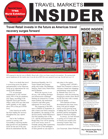 The International Association of Airport and Duty Free Stores (IAADFS) took an important step to help colleagues in the Caribbean who had been impacted by Hurricane Irma, the category 5 storm that flattened some of the key tourist islands in the Caribbean in early September.
The International Association of Airport and Duty Free Stores (IAADFS) took an important step to help colleagues in the Caribbean who had been impacted by Hurricane Irma, the category 5 storm that flattened some of the key tourist islands in the Caribbean in early September.
Hoping to fund immediate relief efforts, the Association contributed US$10,000to the Emergency Assistance Fund of the Caribbean Disaster Emergency Management Agency (CDEMA), a regional inter-governmental agency for disaster management in the Caribbean Community (CARICOM), just days after the storm had passed.
The Agency, which was established in 1991 as CDERA (Caribbean Disaster Emergency Response Agency), is now the regional disaster management body that strategically facilitates, drives and coordinates the promotion and engineering of Comprehensive Disaster Management (CDM) in all 18 countries.
“We have a special connection with the Caribbean region, not just through our association members who are headquartered or who operate duty free and travel retail stores in the area, but also because of the many store operators that have participated in IAADFS events for years,” commented IAADFS President and CEO Michael Payne. “Our thoughts are with all who have been affected by this catastrophic storm,” he added.
“I think this hurricane damage is so much worse than people realize because the knock off effect for the travel industry in the Caribbean is going to be here for quite a while. This is not going to be a two-month fix. It is a nightmare for our industry which is why I picked this CARICAM Group. Airport terminals, cruise ports, downtown shops, the ability to sell, are all affected. Some of the islands are totally wiped out,” Payne tells TMI.
“Some islands have been terribly affected, like The Virgin Islands, particularly Tortola and the USVI. St. John is destroyed,” he added.
“Even those islands that have cruise port terminals will not see the business coming right back. Even if the ships can dock anytime soon, people will not be able to go downtown and buy anything. So we have the knockoff effect – no business and no tourism revenue, not to mention the need to rebuild the airports. The airport in St. Thomas is reportedly destroyed—they are only taking relief flights now, if that.”
Payne said that the IAADFS chose CARICAM because it is established, and has been in existence for many years.
“They already have relief boats going to the islands from Barbados and other places. And we felt that the Caribbean is where we needed to focus, since Houston and Florida (the sites of Hurricanes Harvey and Irma, respectively) have access to more resources than is available in the Caribbean.”
The IAADFS is hoping that its announcement will stir more donations to CARICOM and their emergency fund. “We will do more at the Summit of the Americas but we wanted to get something started right now,” he said.
In more IAADFS news, Payne says the Association’s priority has been preparing the inaugural Summit of the Americas taking place in coordination with ASUTIL in Orlando this March. Payne reports that the energy surrounding the show seems good and that the association is receiving more inquiries about the show than in the recent past.
IAADFS also continues to work on customs simplification that is centered on reporting requirements. “This primarily centers around our U.S. –based operators,but when the process is simplified in the U.S., other markets often follow. This is not very glamorous but it can impact the way that suppliers and operators deal with record keeping at duty free bonded warehouses.”
IAADFS continues to be engaged with WHO activities that could impact and restrict the sale of certain duty free goods—tobacco certainly, but also spirits and confectionery. Among these are labeling issues. “It is very hard to comply on a global basis with some of the labeling requirements currently needed, especially in a travel retail/duty free environment. We are working with the Grocery Manufacturers Association on their SmartLabels concept, which is a technology solution to avoid having to list 14 languages on a label that are required on some items sold internationally. This solution would enable consumers to go online and see all the labeling requirements.”
The Association also works with TSA on anything that impacts security issues, since it affects dwell times, and is also involved in enhancing airport infrastructure. “The IAADFS is part of a coalition that supports increasing the passenger facility charge (PFC), which would provide more money for infrastructure development. Airlines are opposed, arguing that the fee is a tax that is passed on to its passengers, and is unnecessary because airports can raise funds by issuing bonds, and other mechanisms,” says Payne.
The PFC is currently capped at $4.50 per plane ticket but legislation has been introduced to raise the limit. “We are part of the coalition trying to persuade Congress to raise the funding level so there can be more airport infrastructure development. The coalition, called Beyond the Runway, is led by ACI-NA, and includes a wide variety of industry stakeholders seeking to ensure that airports stay strong.
“As a member of the coalition, IAADFS supports the airports’ efforts. From our perspective, this fee goes towards infrastructure development. Better airports, newer airports translate into more retail operations. It means better security. We think it will make traveling better.”
*CDEMA is made up of 18 of the island States: Anguilla, Antigua and Barbuda, Commonwealth of the Bahamas, Barbados, Belize, Commonwealth of Dominica, Grenada, Republic of Guyana, Haiti, Jamaica, Montserrat, St. Kitts &Nevis, Saint Lucia, St. Vincent & the Grenadines, Suriname, Republic of Trinidad & Tobago, Turks & Caicos Islandsand the Virgin Islands.









